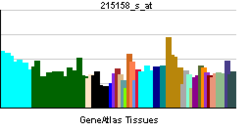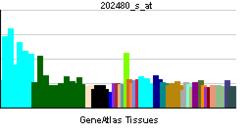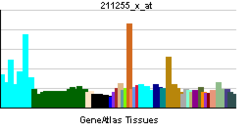- DEDD
-
Death effector domain containing Identifiers Symbols DEDD; CASP8IP1; DEDD1; DEFT; FLDED1 External IDs OMIM: 606841 MGI: 1333874 HomoloGene: 7980 GeneCards: DEDD Gene Gene Ontology Molecular function • DNA binding
• protein bindingCellular component • nucleus
• nucleolus
• cytoplasmBiological process • induction of apoptosis
• spermatogenesis
• induction of apoptosis via death domain receptors
• regulation of apoptosis
• negative regulation of transcription, DNA-dependentSources: Amigo / QuickGO RNA expression pattern 


More reference expression data Orthologs Species Human Mouse Entrez 9191 21945 Ensembl ENSG00000158796 ENSMUSG00000013973 UniProt O75618 Q3U001 RefSeq (mRNA) NM_001039711.1 NM_011615 RefSeq (protein) NP_001034800.1 NP_035745 Location (UCSC) Chr 1:
161.09 – 161.1 MbChr 1:
173.26 – 173.27 MbPubMed search [1] [2] Death effector domain-containing protein is a protein that in humans is encoded by the DEDD gene.[1][2][3]
This gene encodes a protein that contains a death effector domain (DED). DED is a protein-protein interaction domain shared by adaptors, regulators and executors of the programmed cell death pathway. Overexpression of this gene was shown to induce weak apoptosis. Upon stimulation, this protein was found to translocate from cytoplasm to nucleus and colocalize with UBTF, a basal factor required for RNA polymerase I transcription, in the nucleolus. At least three transcript variants encoding the same protein have been found for this gene.[3]
Interactions
DEDD has been shown to interact with Caspase 8,[1][4][5] FADD[1][6] and CFLAR.[4][6]
References
- ^ a b c Stegh AH, Schickling O, Ehret A, Scaffidi C, Peterhansel C, Hofmann TG, Grummt I, Krammer PH, Peter ME (Dec 1998). "DEDD, a novel death effector domain-containing protein, targeted to the nucleolus". EMBO J 17 (20): 5974–86. doi:10.1093/emboj/17.20.5974. PMC 1170924. PMID 9774341. http://www.pubmedcentral.nih.gov/articlerender.fcgi?tool=pmcentrez&artid=1170924.
- ^ Leo CP, Hsu SY, McGee EA, Salanova M, Hsueh AJ (Dec 1998). "DEFT, a novel death effector domain-containing molecule predominantly expressed in testicular germ cells". Endocrinology 139 (12): 4839–48. doi:10.1210/en.139.12.4839. PMID 9832420.
- ^ a b "Entrez Gene: DEDD death effector domain containing". http://www.ncbi.nlm.nih.gov/sites/entrez?Db=gene&Cmd=ShowDetailView&TermToSearch=9191.
- ^ a b Zhan, Y; Hegde R, Srinivasula S M, Fernandes-Alnemri T, Alnemri E S (Apr. 2002). "Death effector domain-containing proteins DEDD and FLAME-3 form nuclear complexes with the TFIIIC102 subunit of human transcription factor IIIC". Cell Death Differ. (England) 9 (4): 439–47. doi:10.1038/sj/cdd/4401038. ISSN 1350-9047. PMID 11965497.
- ^ Alcivar, Allison; Hu Shimin, Tang Jun, Yang Xiaolu (Jan. 2003). "DEDD and DEDD2 associate with caspase-8/10 and signal cell death". Oncogene (England) 22 (2): 291–7. doi:10.1038/sj.onc.1206099. ISSN 0950-9232. PMID 12527898.
- ^ a b Roth, Wilfried; Stenner-Liewen Frank, Pawlowski Krzysztof, Godzik Adam, Reed John C (Mar. 2002). "Identification and characterization of DEDD2, a death effector domain-containing protein". J. Biol. Chem. (United States) 277 (9): 7501–8. doi:10.1074/jbc.M110749200. ISSN 0021-9258. PMID 11741985.
Further reading
- Ewing RM, Chu P, Elisma F et al. (2007). "Large-scale mapping of human protein–protein interactions by mass spectrometry". Mol. Syst. Biol. 3 (1): 89. doi:10.1038/msb4100134. PMC 1847948. PMID 17353931. http://www.pubmedcentral.nih.gov/articlerender.fcgi?tool=pmcentrez&artid=1847948.
- Gregory SG, Barlow KF, McLay KE et al. (2006). "The DNA sequence and biological annotation of human chromosome 1". Nature 441 (7091): 315–21. doi:10.1038/nature04727. PMID 16710414.
- Rual JF, Venkatesan K, Hao T et al. (2005). "Towards a proteome-scale map of the human protein-protein interaction network". Nature 437 (7062): 1173–8. doi:10.1038/nature04209. PMID 16189514.
- Park MY, Ryu SW, Kim KD et al. (2005). "Fas-associated factor-1 mediates chemotherapeutic-induced apoptosis via death effector filament formation". Int. J. Cancer 115 (3): 412–8. doi:10.1002/ijc.20857. PMID 15688372.
- Gerhard DS, Wagner L, Feingold EA et al. (2004). "The Status, Quality, and Expansion of the NIH Full-Length cDNA Project: The Mammalian Gene Collection (MGC)". Genome Res. 14 (10B): 2121–7. doi:10.1101/gr.2596504. PMC 528928. PMID 15489334. http://www.pubmedcentral.nih.gov/articlerender.fcgi?tool=pmcentrez&artid=528928.
- Ota T, Suzuki Y, Nishikawa T et al. (2004). "Complete sequencing and characterization of 21,243 full-length human cDNAs". Nat. Genet. 36 (1): 40–5. doi:10.1038/ng1285. PMID 14702039.
- Alcivar A, Hu S, Tang J, Yang X (2003). "DEDD and DEDD2 associate with caspase-8/10 and signal cell death". Oncogene 22 (2): 291–7. doi:10.1038/sj.onc.1206099. PMID 12527898.
- Strausberg RL, Feingold EA, Grouse LH et al. (2003). "Generation and initial analysis of more than 15,000 full-length human and mouse cDNA sequences". Proc. Natl. Acad. Sci. U.S.A. 99 (26): 16899–903. doi:10.1073/pnas.242603899. PMC 139241. PMID 12477932. http://www.pubmedcentral.nih.gov/articlerender.fcgi?tool=pmcentrez&artid=139241.
- Lee JC, Schickling O, Stegh AH et al. (2002). "DEDD regulates degradation of intermediate filaments during apoptosis". J. Cell Biol. 158 (6): 1051–66. doi:10.1083/jcb.200112124. PMC 2173221. PMID 12235123. http://www.pubmedcentral.nih.gov/articlerender.fcgi?tool=pmcentrez&artid=2173221.
- Zhan Y, Hegde R, Srinivasula SM et al. (2002). "Death effector domain-containing proteins DEDD and FLAME-3 form nuclear complexes with the TFIIIC102 subunit of human transcription factor IIIC". Cell Death Differ. 9 (4): 439–47. doi:10.1038/sj/cdd/4401038. PMID 11965497.
- Schickling O, Stegh AH, Byrd J, Peter ME (2002). "Nuclear localization of DEDD leads to caspase-6 activation through its death effector domain and inhibition of RNA polymerase I dependent transcription". Cell Death Differ. 8 (12): 1157–68. doi:10.1038/sj/cdd/4400928. PMID 11753564.
- Roth W, Stenner-Liewen F, Pawlowski K et al. (2002). "Identification and characterization of DEDD2, a death effector domain-containing protein". J. Biol. Chem. 277 (9): 7501–8. doi:10.1074/jbc.M110749200. PMID 11741985.
Categories:- Human proteins
- Chromosome 1 gene stubs
Wikimedia Foundation. 2010.
